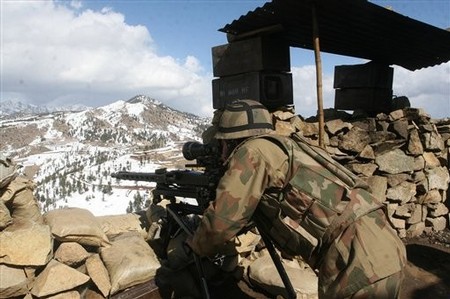
The Wall Street Journal has an ominous report on evidence that al-Qaeda is returning to Afghanistan:
In late September, U.S. fighter jets streaked over the cedar-studded slopes of Korengal, the so-called Valley of Death, to strike a target that hadn't been seen for years in Afghanistan: an al Qaeda training camp.
Among the dozens of Arabs killed that day, the U.S.-led coalition said, were two senior al Qaeda members, one Saudi and the other Kuwaiti. Another casualty of the bombing, according to Saudi media and jihadi websites, was one of Saudi Arabia's most wanted militants. The men had come to Afghanistan to impart their skills to a new generation of Afghan and foreign fighters.
Even though the strike was successful, the very fact that it had to be carried out represents a troubling shift in the war. Nine years after a U.S.-led invasion routed almost all of al Qaeda's surviving militants in Afghanistan, Osama bin Laden's network is gradually returning.
Over the past six to eight months, al Qaeda has begun setting up training camps, hideouts and operations bases in the remote mountains along Afghanistan's northeastern border with Pakistan, some U.S., Afghan and Taliban officials say. The stepped-up infiltration followed a U.S. pullback from large swatches of the region starting 18 months ago. The areas were deemed strategically irrelevant and left to Afghanistan's uneven security forces, and in some parts, abandoned entirely.What's notable about this al-Qaeda comeback, such as it is, is that it occurred during the troop surge, when the U.S. was supposedly breaking the Taliban's momentum. So even at the moment of maximum Western troop presence, al-Qaeda is still able to worm its way into vacant corners of the country. Obviously, some analysts will read this and conclude that we must have American forces in every square inch of Afghanistan forever to prevent small al-Qaeda camps from setting up shop, but how realistic and sustainable is that?
And while the return of al-Qaeda in Afghanistan is troublesome, it also makes them more vulnerable. As the WSJ notes, the U.S. has been conducting ground raids and bombing strikes against al-Qaeda targets in the country - something it cannot aggressively do against al-Qaeda targets in Pakistan.
(AP Photo)











No comments:
Post a Comment